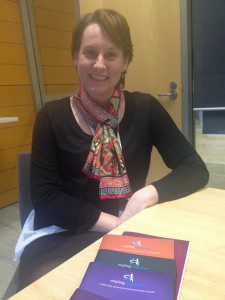
Researchers at the Ingham Institute have enlisted the partners of patients to strike a new blow against the scourge of cancer.
In a world first, a team led by Dr Janelle Levesque, a University of NSW researcher at the Ingham, have produced Coping-Together, a comprehensive information package that helps cancer patients and their partners deal with the emotional roller coaster of challenges unleashed by a cancer diagnosis.
And the results coming back from the pilot study conducted in 2012 and 2013 are so encouraging the researchers have now expanded the study from patients diagnosed with prostate cancer to include those with breast, colorectal/bowel and melanomas – and their partners.
So how was Coping-Together born at the Liverpool Hospital based Ingham Institute?
“There’s an increasing body of research out there that suggests partners are as affected by the diagnosis of the cancer as the patients themselves,’’ says Dr Levesque.
“Anywhere between one in two and one in three partners reported elevated levels of anxiety and distress.
“There was very little information that specifically included partners and none that focuses on the couple in particular, so we decided to support couples as they went through this experience,’’ Dr Levesque said.
As part of the original pilot study, the Ingham team created a comprehensive information package -a one-stop shop, says Dr Levesque – which provided answers to the challenges faced by people who had been diagnosed with cancer.
The package has got it all and it comes in a variety of ways: There’s information booklets with an easy index of subjects at the front, DVD version, a relaxation CD and even a website.
Then the research team recruited people who had been diagnosed with prostate cancer sometime in the previous four months.
The patients and their partners were given the information packages, filled in a survey each at the start and at the end, and were also interviewed by the researchers over the phone four times during the two month period of the study.
As part of the survey, the patients and their partners answered questions on issues such as their levels of anxiety, depression, coping behaviour and quality of life.
“What you will find in our package is information about what you may do when you can’t sleep at night or if you are visiting your doctor and you’re unsure if your main concern is being addressed,’’ Dr Levesque said.
“Or you can find out who’s on your medical team or, if you need it, how to get access to a psychologist, a social worker or a dietician.
“So it’s about increasing their awareness.
[social_quote duplicate=”no” align=”default”]“If you suddenly have trouble talking to the grandkids about your cancer, you go to this page for some suggestions.[/social_quote]
“It’s easy to find suggestions in the package.
“This information resource helps couples prepare a roadmap of how to deal with challenges and it increases their awareness.’’
“Patients and their partners reported lower distress levels, and saw the cancer as less of a threat than they had before,’’ Dr Levesque says of the feedback the research team got from the couples who participated in the pilot study of 2012-13.
“They got a sense that what they were going through was normal and the package also helped them connect with other people and services in their community,’’ she says.
But it wasn’t just the patients who gained from the pilot study – the research team learned about the dignity of people who have just found out they have cancer.
“I learned a lot about the generosity of people,’’ says Dr Levesque.
[social_quote duplicate=”no” align=”default”]“When they are going through an acute crisis themselves, for people to allow me to survey them and phone them every fortnight, four times over, and talk to me so graciously and share their experiences, that was very humbling.’’[/social_quote]
Dr Levesque has a very clear focus how Coping-Together is making a difference to cancer patients:
“I remember being at a conference and someone saying – they will find a cure for cancer at the Ingham Institute,’’ she says.
“And we sat there and went: until they do that, we will make them feel better.’’
♦ The Coping-Together trial is currently recruiting and looking for couples to take part and will continue to do so until late August-early September. If you or your partner are within four months of diagnosis of prostate, breast, colorectal/bowel cancer or melanoma, have not previously been diagnosed with cancer, and are receiving or planning to receive treatment for cancer, please contact Dr Janelle Levesque at the Ingham Institute on 1800 104 597 or email j.levesque@unsw.edu.au.
